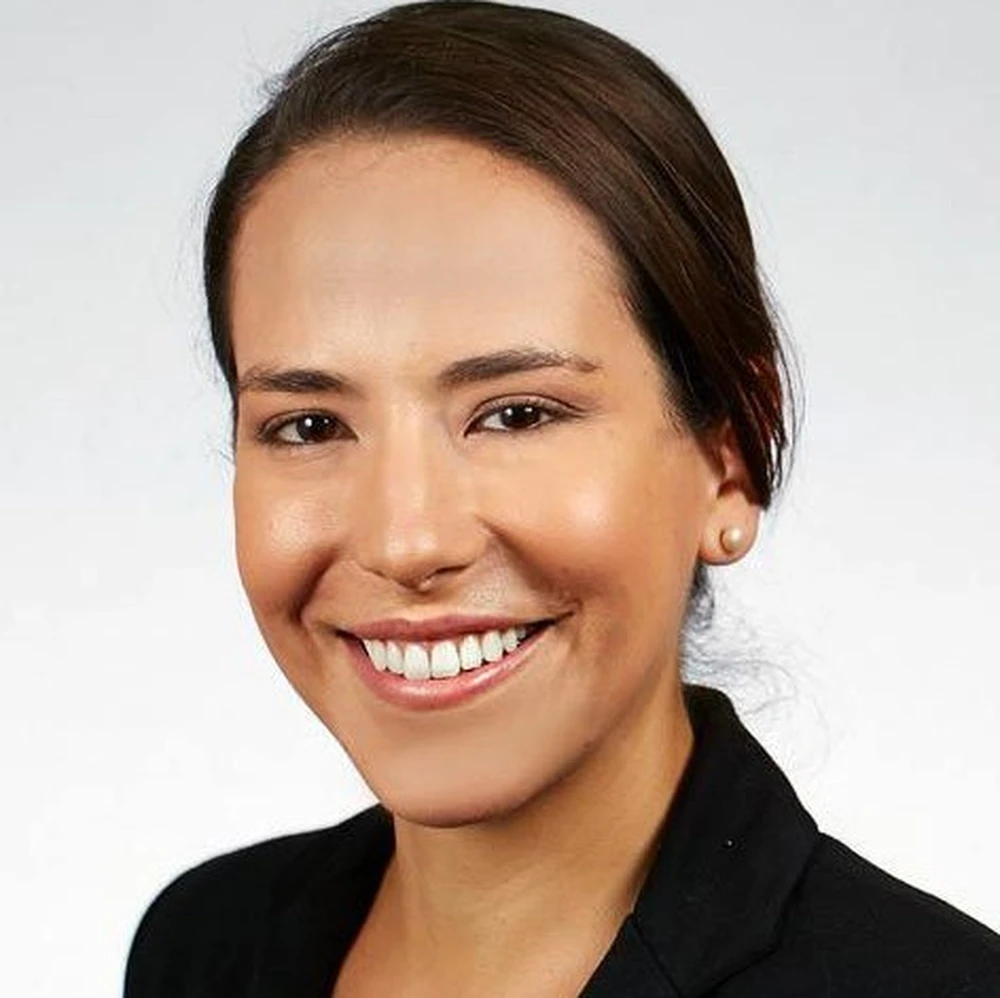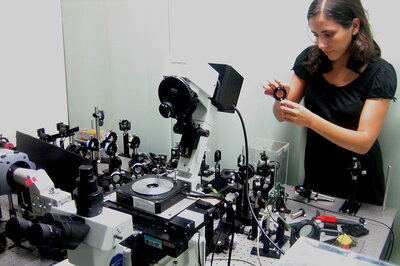
A double-major in chemistry and physics, Markita del Carpio Landry (PhD, ’12, Chemla) said her mother, who was an engineer, was her primary role model when she was young. A native of Bolivia, Landry is now an assistant professor in the Department of Chemical and Biomolecular Engineering at the University of California-Berkeley. She said her mother is still her primary role model.
“My sister and I were not explicitly encouraged to pursue science. I think just being able to see my mom and the passion for her career was likely what motivated us to follow her footsteps,” she said.
Landry completed her PhD in chemical physics at Illinois in 2012 as a member of Yann Chemla's physics lab. The next three years, Landry spent as a National Science Foundation Postdoctoral Fellow at MIT before her appointment as an assistant professor at Cal-Berkeley.
What are some highlights of your research?
We are developing optical probes that allow us to image brain chemistry. Neurons, which are the cells of the brain, communicate with chemical signals by secreting neurotransmitters. By developing probes that allow us to listen in on these neurotransmitter signals in the brain, we are able to study how brain neurochemistry goes awry in psychiatric diseases such as addiction, or in neurodegenerative diseases such as Huntington's Disease.
Separately, my lab also develops nanoparticles to deliver DNA and RNA to plants. The goals of our research here are to enable genetic manipulation of plants to create higher-yielding crops, without integration of foreign genetic material in the plant genome - a process that generates GMO labeling of the transformant.

Did you always know you wanted to be a chemist?
I decided to pursue chemistry as an undergrad at UNC Chapel Hill. While taking a modern physics elective course, I realized that I was also really curious about physics and decided to double major in both. One thing that drew me to pursue graduate studies at UIUC was that their chemistry program offered a PhD in chemical physics. I was able to complete coursework in both chemistry and physics toward my PhD, and complete my thesis research in Yann Chemla's physics lab.
Tell us what sparked your interest in science?
My mom is a telecommunications engineer. Growing up, though I didn't quite understand what she did for work, I do remember the passion she had for her job was infectious. She was on call during the whole Y2K scare, and carried a beeper with her all night. I remember thinking that no matter what happened as computers made the jump from 99 to 00, my mom would be able to fix it!
What I love about science now is, I think, what made my mom so passionate about her work back then. On a daily basis, working with others to solve problems and knowing that the solutions to those problems could contribute to a better quality of life. As a chemical engineer, I am excited by building nanoscale tools that enable us to study living systems.
What’s one of your most memorable academic or career moments?
My sister got her PhD from UC Berkeley Chemical Engineering (the department in which I'm now a faculty member). We overlapped for a few months when I began my professorship, and as she completed her PhD. Her advisor was out of town during that year's graduation ceremony, so I had the privilege of hooding my sister as she graduated with her PhD from our program. My sister went on to join our department as a course lecturer following her graduation, and we co-taught a Unit Operations course: we had a great time being co-instructors, though it was a bit confusing to have two Prof. Landrys on the syllabus!
What was your path to graduate school?
Until I went to college, I did not know anyone with a PhD nor did I understand what career paths were available to PhDs. My decision to go to graduate school stemmed from a curiosity to 'learn more' than what I'd been exposed to in my undergraduate classes and a curiosity about research. My senior year of college, I participated in a workshop hosted at UIUC for underrepresented undergraduate students, through which I applied for admissions to the UIUC college of chemistry. I was very surprised when I was accepted to graduate school!
What changes could help increase the representation of women in science?
To increase representation of women and other underrepresented populations in science, I think we need to confront the biases that we all harbor. Science is difficult enough without the systemic barriers and implicit biases that hinder the progress of underrepresented populations. Moreover, by advertently or inadvertently dis-incentivizing equitable access to STEM, we're also hurting ourselves as a scientific community. Answers to some of science's most pressing and challenging problems will require multiple approaches, and the best way to incorporate multiple approaches to addressing scientific problems is to build teams that have multiple viewpoints.
Have you had challenges to overcome as a scientist?
All the time! Failed experiments are prevalent in science, so it is common to doubt oneself when research projects aren't going as planned. However, it is important to acknowledge that even a failed experiment or negative results can be very useful in determining how to move a project forward. Most of my prior research projects were brought to completion through a combination of positive and negative results that together paint a complete picture of the project, and as I gained more experience in research, I learned to celebrate the negative results that came my way.
When I started my lab at UC Berkeley, I thought my prior training in physics and chemistry hadn't prepared me to do the research I was most excited to do: neurobiology and plant genetic engineering. Although I had never done any research with living systems, I took (what I thought was) a big risk in pivoting my research directions to neuroscience and plant science when I started my lab. Today, my lab works at the interface of nanoscience, neuroscience, and plant biology, an exciting and eclectic range of research topics that always keep me on my toes. I think this experience has motivated me to advise young scientists to pursue the science they are most excited by and passionate about. If I managed to get up to speed on a new field and pivot this late in my career, then anybody can do it!
What do you hope to accomplish in the next decade?
I am confident that, regardless of what I accomplish in the next decade, the undergraduate, graduate, and postdoc trainees from my lab will have accomplished much more than I ever could or will. Therefore, in the next decade, I'm most proud of and excited by all of the exciting things that my former group members will accomplish.
How else has your experience at UIUC helped you in your career?
Getting a certificate in business administration has been invaluable for my current position as a professor. The skills in project, budget, and people management that I learned by getting this certificate at the UIUC business school are skills I use daily now!
What else do you enjoy doing?
I greatly enjoy hiking, camping, and dancing (tango, salsa, and bachata).